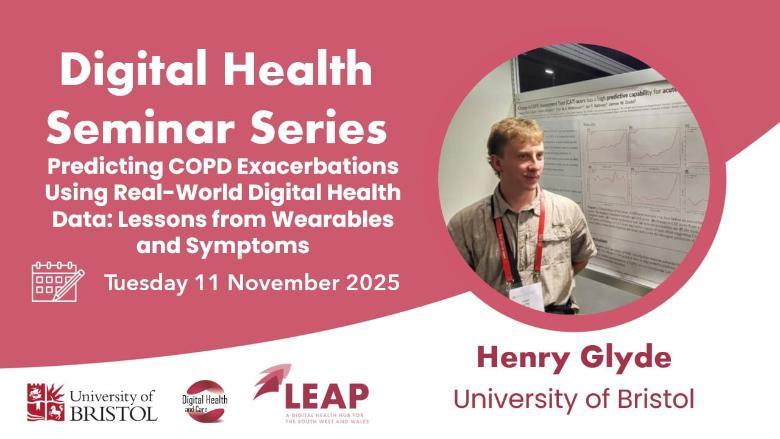Digital Health Seminar Series
Stimulating interdisciplinary connections in health care with innovative technologies
The Digital Health Seminar Series aims to develop international interdisciplinary connections between academics, industry, and healthcare professionals interested in advancing healthcare with innovative technologies.
It is organised by the EPSRC Centre for Doctoral Training in Digital Health and Care, and the EPSRC LEAP Digital Health Hub, at the University of Bristol.
Autumn 2025 Seminar Series
We are pleased to announce the first speakers for the Autumn term Digital Health and Care Seminar Series, which take place every two weeks starting Tuesday 30th September 2025 at 2pm.
Next Event

Henry Glyde, University of Bristol
Topic: Predicting COPD Exacerbations Using Real-World Digital Health Data: Lessons from Wearables and Symptoms
Date: November 11th, 2025 14:00-15:00 GMT
Location: In Person Wills Memorial Building Room 3.23 (University of Bristol only) & Online
Abstract:
Chronic obstructive pulmonary disease (COPD) exacerbations remain a leading cause of hospitalisation and health service burden. Predicting when an individual is about to deteriorate is a major clinical challenge, but advances in digital health and real-world data offer new opportunities.
Using daily data from the myCOPD app, Dr Henry Glyde and colleagues modelled short-term exacerbation risk based on self-reported symptoms, COPD Assessment Test (CAT) scores, and step-count data from connected wrist-worn wearables. Through a rigorous nested cross-validation pipeline, the study compared symptom-based and multimodal models, demonstrating stable predictive performance (ROC-AUC ~0.75) and showing that activity features provide complementary information to symptom trends.
The talk will explore the methodological lessons learned—data quality, baseline modelling, and evaluation design—as well as their clinical implications. This work underpins the development of FORESEE-COPD, an open research platform integrating wearable, symptom, and environmental monitoring to enable personalised, proactive COPD care.
Bio: Dr Henry Glyde is a Research Associate in the Academic Respiratory Unit, University of Bristol, and an NIHR Bristol BRC Postdoctoral Fellow. His research integrates AI, digital health, and respiratory medicine to develop predictive models for COPD using wearable, symptom, and environmental data.
Past Seminars
Pre-2025 past seminars

